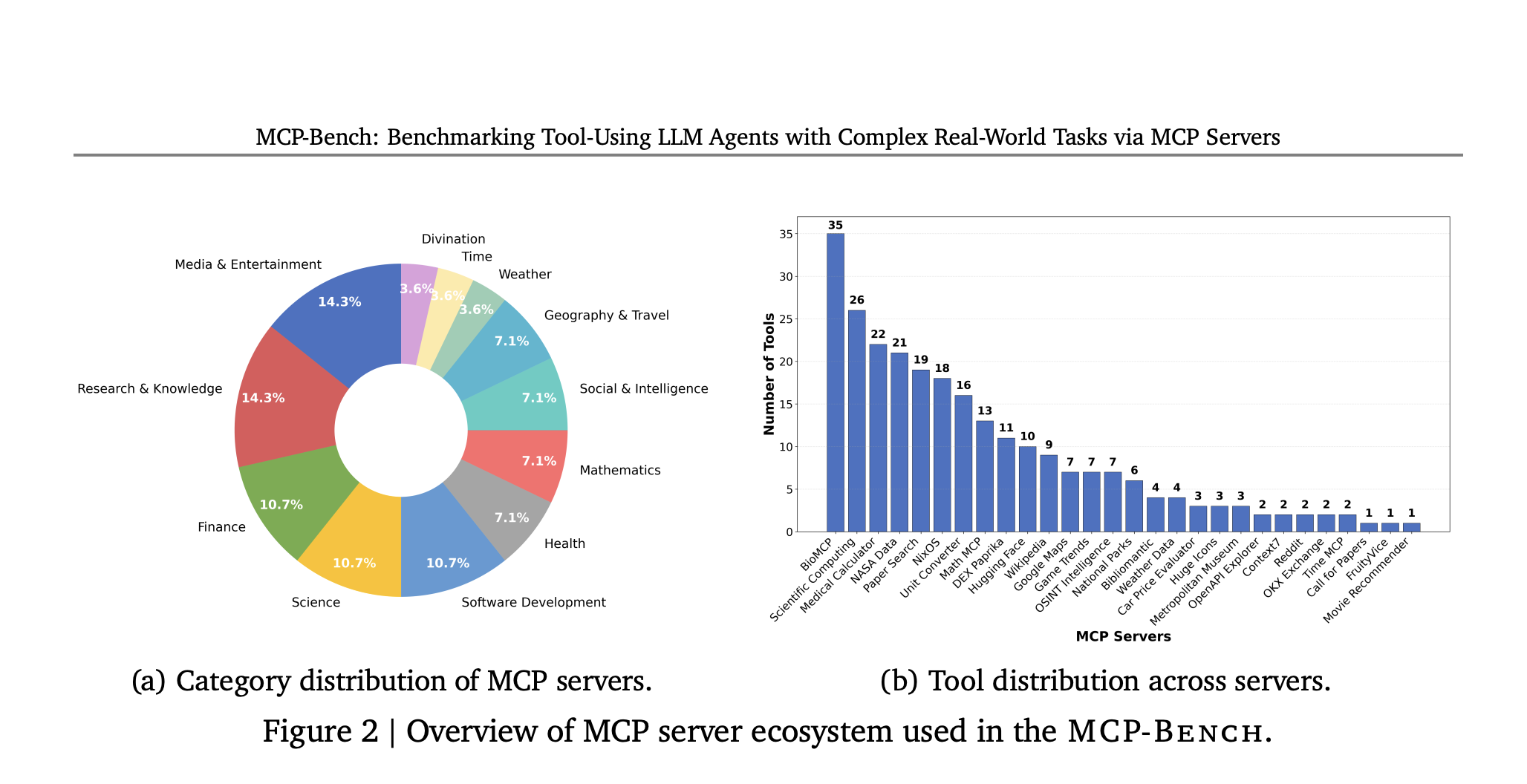Blog
Accenture Research Introduce MCP-Bench: A Large-Scale Benchmark that Evaluates LLM Agents in Complex Real-World Tasks via MCP Servers

Introduction to MCP-Bench
The rapid evolution of artificial intelligence has spotlighted the need for robust frameworks that can effectively evaluate the capabilities of Large Language Models (LLMs) in real-world scenarios. Recently, Accenture Research has unveiled an innovative benchmarking tool known as MCP-Bench. This tool is designed to assess LLM agents’ performance across a variety of complex tasks, utilizing a distributed infrastructure called MCP servers.
What is MCP-Bench?
MCP-Bench stands as a comprehensive assessment platform crafted for evaluating LLM agents. Utilizing modern technologies, it provides a controlled environment that simulates real-world complexities. The primary objective of MCP-Bench is to offer precise metrics that reflect how well these models perform when faced with multifaceted challenges that are typical in day-to-day applications.
Key Objectives of MCP-Bench
The announcement of MCP-Bench addresses several crucial objectives:
-
Diverse Task Evaluation: The benchmark encompasses a wide range of tasks, from natural language processing to intricate decision-making scenarios. This diversity gives insights into the versatility and adaptability of LLMs.
-
Real-World Context Simulation: By mimicking real-world situations, MCP-Bench allows researchers and developers to understand how LLMs would perform in practical applications, rather than just in controlled or simplistic settings.
- Performance Metrics: MCP-Bench establishes standard metrics to evaluate the effectiveness of LLM agents, providing transparent and fair comparisons between different models.
The Importance of Evaluating LLM Agents
With the proliferation of LLMs like GPT-3, the need for thorough evaluation has become paramount. These models are increasingly integrated into various sectors such as healthcare, finance, and customer service. A systematic assessment of their capabilities helps in the following ways:
-
Quality Control: Ensuring that LLMs meet high standards is essential for their successful deployment in critical applications where accuracy is key.
-
Benchmarking Progress: As AI technology continues to advance, having a reliable benchmark helps track improvements and identifies areas needing further development.
- User Trust: By validating the performance of LLM agents through established metrics, stakeholders can develop trust in these systems, fostering wider acceptance and usage.
How MCP-Bench Works
The operational mechanics of MCP-Bench are rooted in its architecture comprising multiple MCP servers. These servers play a pivotal role in running assessments, allowing for distributed processing and efficient resource allocation. Here’s how it works:
-
Task Assignment: MCP-Bench breaks down challenges into manageable tasks, enabling LLM agents to work on specific problem areas in parallel.
-
Data Collection: As the agents operate, data is gathered regarding their responses, processing times, and accuracy levels, forming a comprehensive dataset for evaluation.
- Analysis and Reporting: After executing tasks, the results are analyzed using predetermined metrics. This analysis offers insights into both individual agent performance and comparative evaluations across different models.
Features of MCP-Bench
MCP-Bench is equipped with several notable features that enhance its utility for researchers and organizations alike:
-
Scalability: The architecture is designed to support large-scale testing, meaning that researchers can run multiple evaluations simultaneously without compromising performance.
-
Flexibility: MCP-Bench allows for customization of evaluation tasks, enabling users to tailor assessments based on specific requirements or industries.
- Comprehensive Reporting: The tool generates detailed reports, highlighting strengths and weaknesses in LLM performance, thus providing actionable insights for improvement.
Impact on the AI Landscape
The introduction of MCP-Bench is expected to have far-reaching impacts on the AI landscape:
-
Accelerating Research: By providing researchers with a standard benchmark, MCP-Bench can help speed up the development process for LLMs, allowing for quicker iterations and improvements in AI technologies.
-
Encouraging Collaboration: A universal benchmarking tool encourages collaboration among researchers and developers, as they can share results and methodologies based on a common framework.
- Driving Innovation: With clear metrics and areas for improvement, MCP-Bench can push LLM technology towards new heights, inspiring innovative applications in various fields.
Future of LLM Evaluation
The emergence of MCP-Bench marks a significant step forward in the evaluation of LLMs. As more organizations recognize the importance of reliable assessments, the integration of such benchmarking tools will likely become standard practice in the AI development cycle.
Looking ahead, we can anticipate enhancements in:
-
Assessment Techniques: As the field of AI continues to evolve, so too will the methodologies used for evaluating model performance. Future updates to MCP-Bench may incorporate advanced techniques and machine learning tools for more nuanced evaluations.
-
Interdisciplinary Applications: The use of LLMs spans various disciplines, and cross-industry benchmarks may become increasingly important for ensuring models are fit for purpose in different sectors, from legal to scientific applications.
- User-Centric Standards: There is a growing emphasis on user experience and real-world applicability, and MCP-Bench could evolve to reflect these priorities, ensuring that LLMs not only perform well technically but also meet user needs effectively.
Conclusion
In summary, MCP-Bench represents a substantial advancement in the assessment of LLM agents in complex real-world tasks. By providing a structured and comprehensive evaluation framework, Accenture Research has set a new standard that not only aids researchers but also promotes greater confidence in AI systems. As the landscape of artificial intelligence continues to evolve, tools like MCP-Bench will be critical in fostering innovation, collaboration, and ultimately, the successful integration of AI technologies across various sectors.

